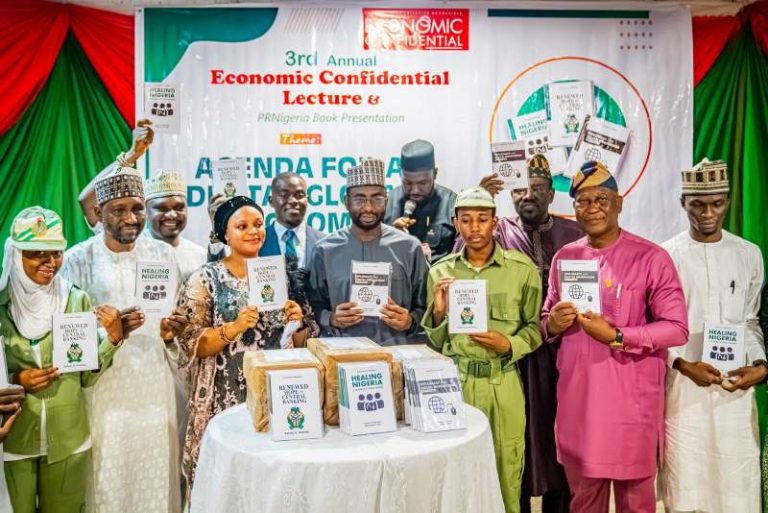Being text of a presentation by Prof. U. G. Danbatta, FNSE, FNIEE, FAEng, FRAES, Executive Vice Chairman/Chief Executive Officer, Nigerian Communications Commission, at the Maiden Edition of Policy Implementation Assisted Forum (Piafo-001) on National Policy for Promotion of Indigenous Content in the Nigerian Telecommunications Sector.
ESTABLISHING RULES AND LAWS FOR THE EFFECTIVE IMPLEMENTATION OF LOCAL CONTENT PROMOTION POLICY IN THE NATIONAL TELECOMS SECTOR
The Nigerian Communications Commission is pleased to collaborate with Messrs. Business Metrics and their partners to deliver this great maiden initiative of its Policy Implementation Assisted Forum on the National Policy for Promotion of Indigenous Content in the Nigerian Telecommunications Sector (aka PIAFo-001).
The Commission considers stakeholder engagement and consultation as a key strategic regulatory approach hence the success story of the sector is largely attributable to the wide consultations and engagements employed at every step of the sectors journey.
Introduction
Indigenous Content Policy generally means any policy that encourages the development of indigenous skills, technology transfer, use of indigenous manpower and indigenous manufacturing. With advancements in technology, Administrations have come to recognize the need for their indigenes to participate actively in the exploitation and transformation of their resources into goods and services aimed at economic growth.
As we are all aware, the Federal Government has put in place very robust policy and legal framework for local content within the oil and gas sector. Similarly, the advent of local content in the Nigerian Telecoms sector is probably as old as the Nigerian telecoms revolution itself. The National Telecommunications Policy posited that the domestic production of telecommunications hardware and software is desirable for national development. It further states that Government shall encourage domestic production of telecommunications equipment, components and software to meet local and export demands.
In giving legal backing to the above policy direction, the Nigerian Communications Act, 2003 identifies, as one of its primary objects the encouragement of local and foreign investments in the Nigerian communications industry.
With the steady evolution of Telecommunications in Nigeria, the industry and its infrastructure are appreciated as the infrastructure of infrastructures, positioned to drive growth and efficiency in every other sector (both private and public) by supporting the optimization of institutions and processes in the ecosystem. Accordingly, the development of effective local participation at all levels of the value chain becomes a sine-qua-non to the overarching national economic development and market success.
Updates on Indigenous Content Valorization in the Nigerian Telecom Industry
The Federal Government recently reinforced the local content agenda by putting in place Executive Order 003 of 2017 and Executive Order 005 of 2018 titled Support for Local Content in Public Procurement by the Federal Government and Development of Local Content in Science, Engineering and Technology respectively. The Commission instituted several measures and strategies towards ensuring compliance by the industry to the aforementioned Executive Orders, these include building local capacity through various initiatives and innovations which are aimed at encouraging digital skills and entrepreneurship as well as building local infrastructure.
The NCC is vigorously promoting local investment in digital infrastructure and competition in the provision of accessible high-speed broadband infrastructure. This will in turn enable the Commission to deliver on the stipulated targets in the Nigerian National Broadband Plan (NNBP) 2020-2025. Towards achieving the mandate, the Commission has developed a licensing framework to enable infrastructure companies (INFRACOs) roll out optical fibre cables for communications in the 774 Local Government Areas that make-up the Federation. The Commission also ensures full utilization of spectrum for deployment of services through Re-farming, Re-planning and Auctioning.
His Excellency, President Muhammadu Buhari GCFR, recently presented the National Policy for the Promotion of Indigenous Content in the Nigerian Telecom Sector. The Policy (a.k.a NPPIC) seeks to accelerate the pace of indigenous digital capacity development and thereby enhance national competitiveness and prosperity for indigenous/local players in Nigeria.
In the Policy document, there are clearly defined objectives identified for each focus area with the expected significant impact that a concerted implementation would have on the sector and the national economy.
In addition, the Commission has developed an action plan to help guide the implementation of the Policy. To this effect, the Commission has articulated several targets and high-impact interventions, which are Specific, Measurable, Attainable, Relevant and Time-based to address the major policy areas. The focus policy areas are Manufacturing, Software Development, Compliance Monitoring, Licensing, Funding, People, and Research & Development for Digital Innovation and Entrepreneurship.
NCC’s Roadmap for implementation of the Policy for the Promotion of Indigenous Content in the Nigerian Telecom Sector
As required by the Policy, the Commission has established the Nigeria Office for Developing the Indigenous Telecoms Sector (NODITS). This Office is saddled with the responsibility of implementation of the NPPIC as well as the Executive Orders 003 and 005. Relevant portions of the Nigerian National Broadband Plan (NNBP) 2020-2025 as well as the National Digital Economy Policy and Strategy (NDEPS) are also under the purview of this new office called NODITS.
Other Departments within the Commission are equally saddled with responsibilities that help to inculcate indigenous participation in the telecom sector. Efforts being made by the Research & Development and Licensing Departments are worthy of mention in that regard. Under the auspices of the Research & Development Department, the Commission has sponsored research efforts in several universities across the country. Notable areas of research conducted include “Development of All Weather Solar Systems For Energy Optimization in a Mobile Communications Base Stations” (at Ekiti State University of Technology), “Design and Fabrication of Meta-material Inspired UWB/MIMO Antenna for the 5G-Sub 6GHz Application” (at Taraba State University) and “Intelligent Autonomous Multi-UAVs (Multiple Drones) Swarm Monitoring for Effective Surveillance and Situation Awareness in the Nigerian Telecommunications Industry” (at Gombe State University). By these activities the Commission seeks to identify with and harness local resources in Nigerian institutions of learning for the benefit of the industry.
Through R&D, the Commission has also successfully initiated Professorial Chairs in Abubakar Tafawa Balewa University (ATBU), University of Ibadan, Federal University of Technology, Owerri (FUTO) and Bayero University Kano. This is informed by the need to establish concrete local linkages to deepen the relationship between the telecom industry and the academia in Nigeria; and to provide the missing integration and collaborative partnership required to galvanise qualitative indigenous solutions in telecommunications in Nigeria. R&D also supports the development of local Tech-Hubs and hackathon initiatives aimed at supporting indigenous upstarts, App developers and ICT innovators in general.
The Commission has identified several areas of collaboration with other Agencies and Non-Governmental Organizations such as National Office for Technology Acquisition & Promotion (NOTAP), Small & Medium Enterprises Development Agency (SMEDAN), National Agency for Science & Engineering Infrastructure (NASENI), National Information Technology Development Agency (NITDA) and Rockefeller Foundation. Equally, there are plans towards direct intervention in line with subsisting policies e.g., in the local production of corrugated optical ducts (COD) to cater for fibre requirements in Nigeria and ultimately for export.
With the constitution of the NODITS, the industry should expect new Guidelines and Regulations bothering on indigenous content, local manufacturing of telecom equipment, outsourcing of services, construction and lease of telecoms ducts, succession planning in the telecoms sector, corporate governance, corporate social responsibility, etc. as the need arises.
The Commission has already constituted a standing licensing review committee that is currently examining all its licenses in an effort not only of modernizing it to reflect the current realities of technology and development but also to consolidate, bundle or un-bundle individual licenses or even create new licenses.
Global/Regional Agenda for Local Content
The International Telecommunications Union (ITU) emphasizes the effectiveness of ICTs for the sustainability of indigenous contents amongst member States. By the very nature of telecommunications, a large aspect of the content and procedures is global in nature, yet significant aspects are also local. ITU recognizes the need to sustain the balance between local and global content in the sector.
This search for a balance presents opportunities and challenges for the regulator. In that regard, there is a pressing need to find a middle ground between optimizing indigenous participation in ICT and maximizing the benefits of a globalized ICT ecosystem. For us in the Commission, we agree with the notion that such a balance is achievable through purpose driven policies that create an enabling environment towards local innovation, local participation, local job creation, local investment and local ownership.
Collaboration with National Information Technology Development Agency (NITDA)
A key mandate of the Commission under the NPPIC is periodic benchmarking with NITDA, our sister Agency. In that regard, it is gratifying to note that sometime in 2013, NITDA introduced Guidelines on Nigerian Content Development for the Information and Communications Technology (ICT) sector.
In brief the NITDA Guidelines set out to introduce content requirements for all companies operating in the Nigerian ICT industry and to achieve a target of 50% local content in the industry. All ICT companies were also required to be registered under Nigerian entities with predominant Nigerian representation. The guideline is not restrictive but is aimed at encouraging local value creation for ICT companies.
Focus areas of the guidelines include driving indigenous innovation, developing the local ICT industry and establishing intellectual property regulation and standards protection.
Conclusion
Ladies and Gentlemen, I would like to assure you that the Commission is wholly committed to realizing the vision of Mr. President for promoting indigenous content in the telecommunications sector as has been done in the Agricultural and Petroleum sectors to achieve our goals of significant participation, preservation of scarce foreign exchange and improving the lives of Nigerians.
To ensure effective implementation of these objectives, we are developing a robust compliance monitoring and enforcement framework leveraging on existing mechanisms. We are spurred by the words of Mr. President:
“… we want Nigerians to play a major role in the design and manufacture of devices, in meeting the manpower requirements and in becoming an active part of the telecommunications ecosystem of the country.”
Indigenous Content Development in the Nigerian Telecom sector is set to fly, and the Commission calls on all its stakeholders to come on board to achieve maximum success.
Thank you.
Prof. U. G. Danbatta, FNSE, FNIEE, FAEng, FRAES,
Executive Vice Chairman/Chief Executive Officer, Nigerian Communications Commission
https://any.peopleandpowermag.com/for-the-record-establishing-rules-laws-for-effective-implementation-of-local-content-promotion-policy-in-telecoms-sector/



